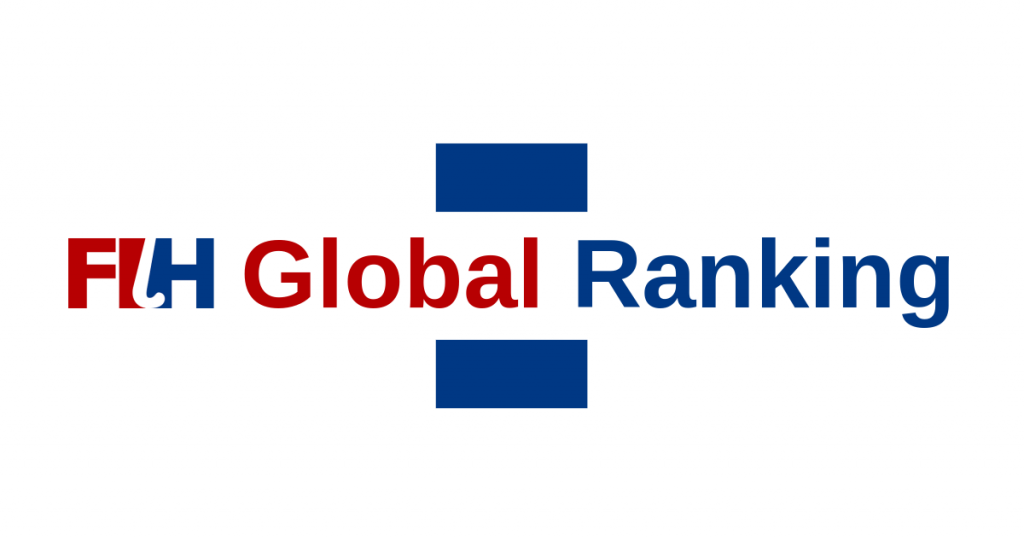 Announced in March 2019, we will finally see a fair FIH global ranking as of next year. We discussed this major change for the better and some other changes announced in March with Jon Wyatt, sports director for the FIH in a podcast for Studio Hockey. Listen to this podcast here and fast forward to 15:50 to listen to Wyatt about the new system for a better global ranking.
Announced in March 2019, we will finally see a fair FIH global ranking as of next year. We discussed this major change for the better and some other changes announced in March with Jon Wyatt, sports director for the FIH in a podcast for Studio Hockey. Listen to this podcast here and fast forward to 15:50 to listen to Wyatt about the new system for a better global ranking.
So our global ranking will be reshuffled in January 2020. Not because of some major upsets in a recent FIH tournament. But rather because the system behind this global ranking will change. It’s a big change and one for the better… I wrote about the issues with the FIH global ranking many times before and as early as 2013, so I’m happy to finally see a fair ranking after all these years of complaining about it 😉
Today countries can only rake up their global ranking points by performing in major international events/tournaments. However some countries never make it to these global events and get stuck in the qualifiers without a possibility to earn some ranking points for their efforts. Other countries often get these points without earning these on the field for being asked to host certain events and thus immediately being qualified for them as well. So the most important change will be the move from a tournament-based ranking to a match-based ranking! Meaning all “less experienced” hockey countries will finally be able to move up (or down) on the ranking as well without having to spend their full budget on one international event. That will help the so-called smaller hockey countries prove to their government or sport institutes they are making progress and deserve the financial support to get them to the next step… But as important at least we will finally have a more fair global ranking with less “free gifts” to certain countries.
What’s wrong with the current global ranking?
 Many will be wondering what went wrong with the current global ranking. The current top 3 seems to be correct? Why is it not a fair system?
Many will be wondering what went wrong with the current global ranking. The current top 3 seems to be correct? Why is it not a fair system?
Today the maximum amount of points a country can earn is 750. Gold medal winners at the Olympics and the World Cup get 750 points. But the strange thing is events where participation is not open to all, such as continental championships, also offer 750 points to the winner. That makes countries like Australia, New Zealand and Argentina get these points almost for free because of the lack of competition in their continent. Meaning Australia will get points as if they became world champion or Olympic champion just for beating 1 country… New Zealand. Same for Argentina who just have to beat Canada to be rewarded like a world champion. Where as to become European champion a country will have to win a tournament with half the global top 10 participating. So basically countries like Australia and Argentina, but even their runner-up countries get free gifts every two years making it easier to remain among the top.
Besides this there is the problem with points being given for invitational tournaments. Such as the Champions Trophy. An event we all loved but its participants should never get world ranking points because participation is not based upon merits but rather on commercial or promotional interests. This way India for example got a lot of global ranking points it did not earn on the field but rather in the boardroom thanks to their sponsors. Today still we experience the same problem with the FIH Pro League. A country like New Zealand for example without winning a single game in the Pro League earned more points compared to for example Ireland or Malaysia who made it to the final of the FIH Pro Series, but were not allowed/invited to play the FIH Pro League. Unfair… Hence the need for a different system behind the FIH global ranking.
How will the new ranking work?
 We spoke to Jon Wyatt, director sport & development for the FIH about the new concept behind the FIH global ranking. Wyatt says “not much” will change for the current top 20 and performing well on the Olympics and World Cup will still have the biggest impact on your ranking.
We spoke to Jon Wyatt, director sport & development for the FIH about the new concept behind the FIH global ranking. Wyatt says “not much” will change for the current top 20 and performing well on the Olympics and World Cup will still have the biggest impact on your ranking.
The most important reason for the FIH to adapt the system behind the FIH global ranking is to allow also lower ranked countries to show to their government or sport institutes, often decision makers with regards to their funding, they too are making progress.
So we move away from a system based upon tournaments towards a new system based upon matches, all official matches. The FIH has been busy for over two years of testing and improving upon several algorithms and formulas to make sure the new FIH global ranking will be balanced and fair. The reason for a new start on January 1st of 2020 is to make sure the new system will not have an impact on the playing schedule for the Games of Tokyo 2020. Because changing the system in the midst of qualifications is not done obviously.

The points a country can earn for any official match will depend upon 3 elements:
- Win, draw or lose obviously.
- The difference in ranking between the two opponents prior to the game.
- The importance of this specific match.
Another important element besides these 3 above, will be the fact it will be a so-called zero sum calculation. Meaning if the winner of this match would win 20 points the loser would lose 20 points.
Suppose, as mentioned in the 2nd element above, the opponents are not exactly matched up in strength. For example a top 3 nation like Belgium would play a nation ranked around the 15th position like Pakistan. Logic would dictate it would be a bigger performance for Pakistan to beat Belgium than the other way around. So the reward for Pakistan should be bigger if they win, compared to Belgium for an anticipated Belgian win. So for example a Pakistani win would result in them gaining 30 points and Belgium losing 30 points in the ranking. While a Belgian win would result in 10 points plus for Belgium and 10 points minus for Pakistan.
Regarding the 3rd element above we can assume these points would be allocated in case of a normal, though official test game. But if this would be the semi final at a World Cup, the importance of that game should also be taken into account. For example these points could be multiplied by 5 meaning a Pakistani win would result in a 150 point game or in case of a Belgian win in a 50 point game.
So to sum up… the new FIH global ranking might not become simpler but it will be more fair… and in the end that’s what’s most important. The points from the example above are fictional. The FIH is still testing and tweaking several possible formulas and algorithms to come up with the best system. The basics are as described above but the details are still to be decided.
We will have to be patient until January 2020 to be able to judge the real impact of these proposed changes on the FIH global ranking. However if they don’t screw up this will be a more fair ranking finally… and that is what you want in sports!

